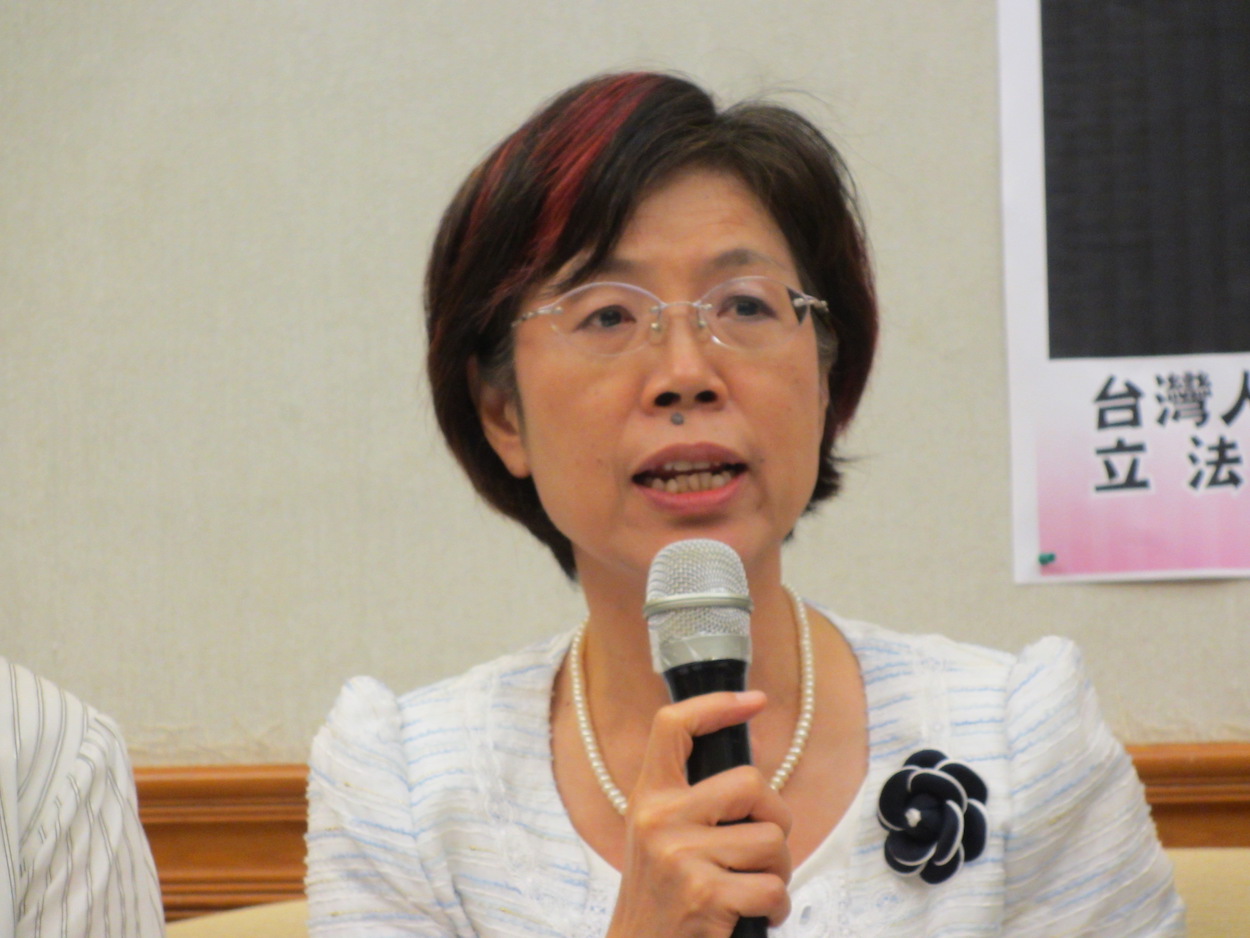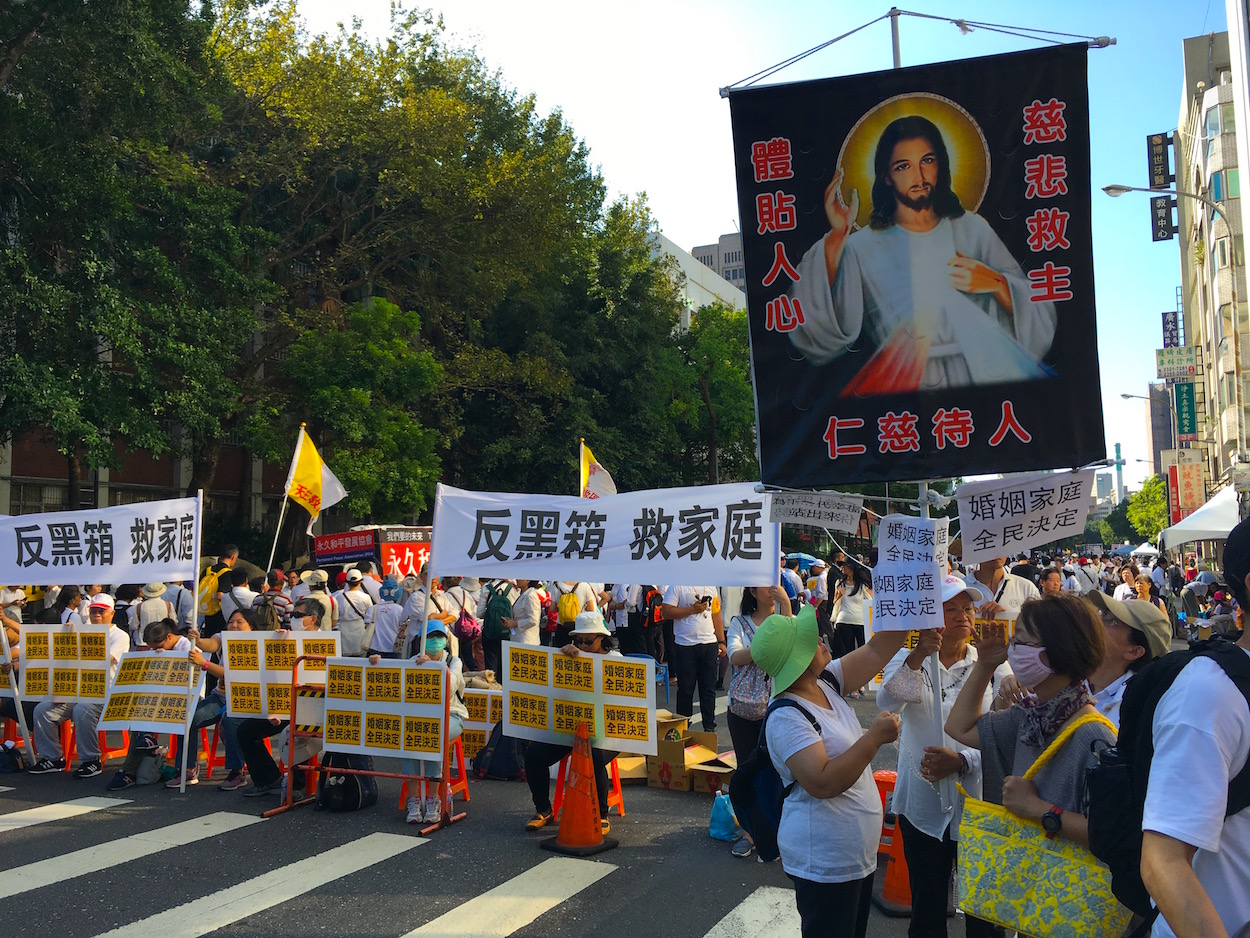by Brian Hioe
語言:
English
Photo Credit: Brian Hioe
POLITICAL CONTESTATION regarding gay marriage continues in Taiwan, with pro-marriage equality groups and anti-gay groups still contesting the issue. The legal terrain has become further complicated since late November, when a national referendum on gay marriage and LGBTQ-friendly education was held alongside nine-in-one elections in late November.
Namely, while the results of the referendum resulted in gay marriage and LGBTQ-friendly education both being voted down, marriage equality advocates continue to call for the legalization of gay marriage as full marriage equality, rather than “separate but not equal” civil partnerships.
 Yu Mei-nu. Photo credit: VOA
Yu Mei-nu. Photo credit: VOA
In particular, the original ruling by the Council of Grand Justices in May 2017 specified that the Legislative Yuan needed to take action to legalize a form of same-sex marriage in the next two years. After the results of the referendum, the Legislative Yuan has finally taken action on the matter, as has the Executive Yuan, which also put forward its own version of a bill on same-sex marriage.
However, both versions call for the legalization of civil partnerships as the form of “same-sex marriage” they intend to legalize, rather than full marriage equality. Those who have contested this in the DPP, such as DPP legislator Yu Mei-nu, have been sharply attacked by DPP majority speaker Ker Chien-ming, who suggested that she should leave the party.
Since the defeat of marriage equality in both referendum questions on gay marriage, there has been increased criticism of those who were instrumental in pushing for so much energy and manpower to be focused on securing a version of the referendum on marriage equality with slightly different wording.
In particular, in response to the successful push by anti-gay groups to have a referendum question on marriage equality put onto the ballot, the marriage equality movement decided to adopt the strategy of also pushing for a referendum question on marriage equality. In adopting this strategy, marriage equality advocates pushed for a wording which was favorable to marriage equality, while the wording pushed for by opponents of marriage equality was unfavorable to marriage equality.
The criticism has also been made that basic human rights should have never been put to a referendum, to begin with and that it was a mistaken effort for the LGBTQ movement to put marriage equality to the popular vote. One expects the marriage equality movement to be more wary of national referendums going forward.
 Christian anti-gay demonstrators in November 2016. Photo credit: Brian Hioe
Christian anti-gay demonstrators in November 2016. Photo credit: Brian Hioe
What the new strategy of the marriage equality movement will be remains to be seen. In the meantime, marriage equality advocates are attempting to point to how civil partnerships will not have the same rights as full marriage equality, with diminished rights for gay couples pertaining to spousal pensions, holidays for marriage, inheritance of property, and rights of parentage. It is very possible that a legal challenge against impending civil partnership ruling will follow as the next means of contestation for the marriage equality movement, with the argument that civil partnership does not fulfill the requirements of the Council of Grand Justices’ Interpretation No. 748 in failing to meet the requirements for equal marriage equality.
On the other hand, anti-gay groups have been emboldened by their victory in the referendum, and demand that the results of the referendum be implemented by the Legislative Yuan immediately. Anti-gay groups have adopted the strategy of insisting that the referendum is legally binding, seeing as it met the 25% of voter participation usually needed for a referendum to be legally binding.
Anti-gay groups continue to distribute information arguing that the government is legally required to act on the referendum results. This is despite the fact that the current version of the Referendum Act does not allow for referendums on constitutional issues. This means that despite reaching this threshold, the Council of Grand Justices’ ruling or subsequent actions by the Legislative Yuan and Executive Yuan should take precedence over the referendum. However, in spite of the fact that the referendum would not have superseded the ruling by the Council of Grand Justices, the Central Election Commission allowed the referendum to proceed anyway.
Either way, anti-gay groups were successful in their push against marriage equality, because in this way, they were able to influence the actions of the Legislative Yuan and Executive Yuan through the referendum—even if the referendum itself would not have been legally binding.
 Marriage equality rally on November 19th, 2018. Photo credit: Brian Hioe
Marriage equality rally on November 19th, 2018. Photo credit: Brian Hioe
Yet one expects that anti-gay groups, encouraged by their successes, may also express displeasure with even the civil partnership bills pushed for by the Legislative Yuan and Executive Yuan as ceding too much ground, and attempt to make an argument on the basis of the referendum result against these bills. This has not yet taken place but is highly likely.
Namely, Christian groups who played a key role in mobilizing against the marriage equality referendum have declared that they intend to run close to 80 legislators in the next set of elections, constituting a political party of their own, possibly backed by millions of dollars of American funding funneled into Taiwan by American Christian groups. Conservative Christian groups who began mobilizing in response to the possibility of marriage equality being legalized in Taiwan may have become unified as a political force through the referendum and now they may be a permanent force to reckon with in Taiwanese politics. If so, they may be emboldened to push for a broader agenda of remaking Taiwan in the image of their religious ideals, and not just settling with blocking gay marriage.

